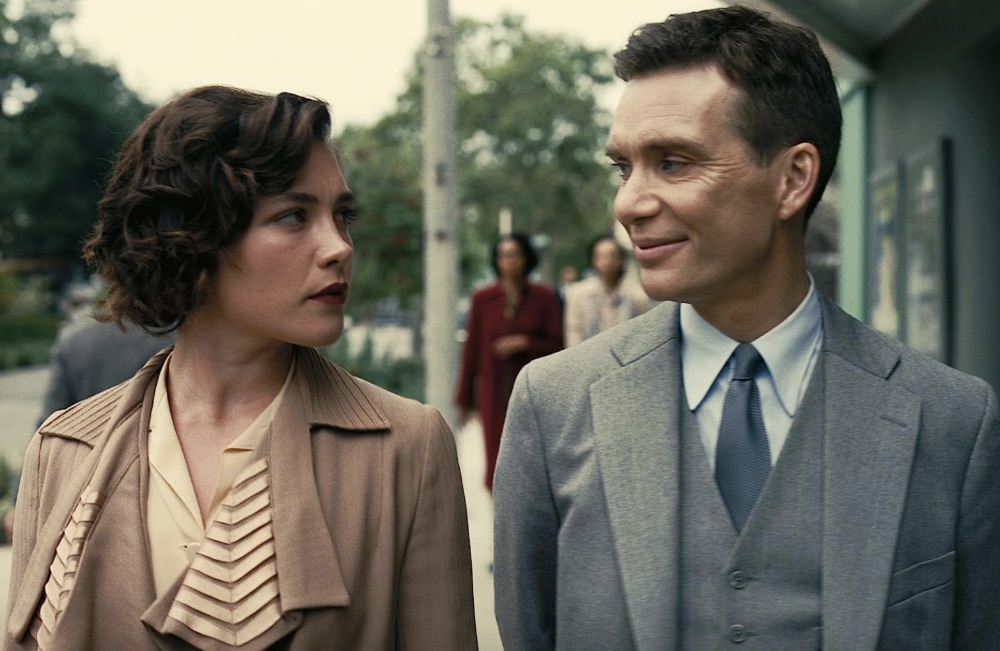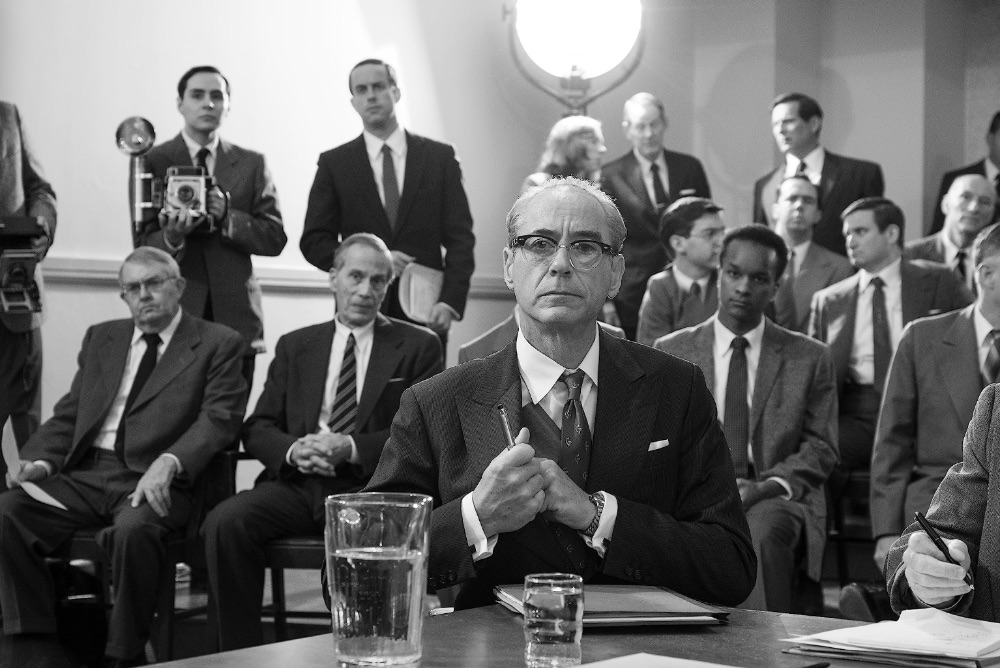In a way, Christopher Nolan’s three-hour, shot-in-IMAX historical docudrama epic entitled Oppenheimer isn’t really about J. Robert Oppenheimer at all. Yes, even though it’s full of extreme closeups of the anguished scientist and much figurative rending of garments over his role in the creation of our modern world in which an atomic sword of Damocles hangs over us all.
I’m serious.
I mean, obviously, yes, the film does focus on the theoretical physicist, the man who led the United States’ secret program during World War II to develop an atomic bomb. Cillian Murphy (A Quiet Place: Part II, The Party) as the scientist is mesmerizing, conveying calamitous inner turmoil while remaining still and modulated on the surface, even when his lack of apparent reaction damages him. This can only be called a pointillistic portrait, one full of staccato visuals that hit rapid-fire but also somehow lazily, not least as Nolan switches from often intensely hued — indeed, fiery hued — color images depicting Oppenheimer’s subjective experience of his life and work, to cooler, calmer black-and-white to show the external, more objective reality in which he operates.

(There’s a lot going on in this film, on so many levels, but I suspect entire theses will be written alone about the distinction Nolan makes here between personal emotional and intellectual experience as more vivid to the individual [obviously?] versus the drier, more distant, more neutral impartiality of everything outside of ourselves… and the limits of that, too, since it can only be cast through subjective eyes such as those of a filmmaker or a historian. This movie is a darker, grimmer, film-stock-flipped Wizard of Oz, and way more existential, dreaminess turned deadly actuality. Not that Oz didn’t have its own grimdark existentialism, of course.)
Nolan (Tenet, Dunkirk) casts Oppenheimer as a man possessed by preternatural visions of the subatomic world, a strange reality that the mathematics says must exist but which he can see only in his imagination… and this is one of Nolan’s startling uses of IMAX. We’ve been trained to expect that IMAX pictures will capture the bigness of the world, but Nolan goes in the opposite direction here, zigzagging dots trailing light on the biggest movie screen we have suggesting the unfathomably minuscule realm far beneath our awareness. It’s like a buzzing in your ear of the universe’s tiniest unseen insects, hounding you to accept them even as you cannot comprehend them.

(Nolan does go big with his pictures, too. His incredibly brief yet horrifyingly riveting impression of one worry that dogs the atomic scientists — would a runaway atomic reaction set off by a successful bomb ignite the planet’s atmosphere and Jesus fucking Christ they went ahead with it anyway — is perhaps the imagery that haunts me the most from the movie.)
Yet as much as Nolan’s Oppenheimer is very much stuck in his own head, he can also be thoughtless and impulsive, giving in to urges without considering the consequences of them, from an itch to poison (what? yup!) a professor when he was at Cambridge university, to an ill-advised sexual situationship with a fellow pseudo-communist (Florence Pugh, goddess: Black Widow, Little Women) in the pre-war years, to a momentary lapse into wearing a military uniform that does not suit him in any way in the early days of the Manhattan Project. Nolan’s Oppenheimer can be very self-involved… to the point where you kinda wanna smack him out of it. Which his wife, played by a caustic Emily Blunt (Jungle Cruise, A Quiet Place: Part II) as a brilliant woman underappreciated by the world, almost literally does. (Ironically, or perhaps not, given his track record, Nolan underappreciates her character and the actress as well.) It comes in a moment where Oppenheimer is castigating himself for being, frankly, a huge jerk and suffering the consequences of this — in a personal capacity, not a military-industrial-scientific-complex one — and it’s almost the thematic centerpoint of the film. It’s echoed later, when in an astonishing one-scene cameo, Gary Oldman (The Hitman’s Wife’s Bodyguard, Darkest Hour) as US president Harry Truman berates the physicist as a “crybaby” for feeling as if he had “blood on his hands” after Hiroshima. Truman was the one who dropped the bomb(s), after all: Oppenheimer only made the bombs.

There is a paradox at the nucleus of Oppenheimer. I don’t think Nolan has any intention of suggesting that Oppenheimer shouldn’t have felt guilty or responsible for what his work led to. It is and would be only human for him, for anyone, to do so. (Indeed, Ludwig Göransson’s [Creed II, Black Panther] aggressive score and the film’s relentlessly belligerent sound design, not to mention the overwhelming impact of the IMAX visuals that are both intimate and epic, ensure that we feel in a visceral way how tormented Oppenheimer is.) And yet the film projects what could be seen as, at worst, disdain for Oppenheimer’s pity-poor-me martyrdom. At best, Oppenheimer is dismissive of the notion, which the man himself as depicted here seems to hold, that Oppenheimer is solely to blame for the horrors that his atomic-bomb project unleashed. Because once the possibility of an atomic bomb was conceived of, someone was going to make it happen, certainly in the context of World War II. The whole point of the Manhattan Project was to build a bomb before the Nazis did. (The deeper question of why we seem, as a species, constitutionally driven to find the most violent, most destructive uses of our scientific knowledge is a philosophical conundrum for another film.)
Truman’s point is well taken: No matter who built the bomb, it would be, and was, the politicians who decided when, where, and how to deploy it. And boy howdy, the character who represents that side of the equation is a doozy. Although much in the same way that the film isn’t really about Oppenheimer, it’s also not really about this other major figure either: Lewis Strauss, a former (as of 1959, the present-day of the film) Atomic Energy Commission head vying for a seat in US President Eisenhower’s cabinet. The film is structured as a series of nested flashbacks around Strauss’s confirmation hearings in the US Senate, which involve Oppenheimer because of the publicly and politically contentious professional relationship the men shared.

Robert Downey Jr (Avengers: Endgame, The Judge), in his finest and most interesting performance since before Marvel, plays Strauss as a shallow, grasping functionary unaware of how absolutely useless he is, a contrast to Oppenheimer’s profound intellectualism but also a complement to the scientist’s self-involvement: Strauss is just as focused on himself as Oppenheimer is, if with far less self-awareness about it. Nolan mines extraordinary suspense from a simple exchange between Oppenheimer and Albert Einstein (Tom Conti: Paddington 2, The Dark Knight Rises) that Strauss witnesses but cannot overhear, during which Strauss believes Oppenheimer must have said something that soured Einstein on Strauss, because everything went to shit for Strauss after that, and what other reason could there be?
(This leads directly to one of the many tiny, unsettling zingers of the film, a bit of snark from Alden Ehrenreich’s [Solo: A Star Wars Story, Hail, Caesar!] aide to Strauss about that mysterious exchange. Such an amazing ensemble cast in this film! Entire theses will be written about that, too.)

When we at last hear that conversation — this final flashback is the closing scene of the film — it’s shocking for what is said, and also for what isn’t. It’s here when what Oppenheimer is about hits hard, and it is, once again, paradoxical: With the power to destroy ourselves unleashed — not just nukes but global warming, possibly AI, maybe genetic engineering, probably lots of other potential nightmares — how such awesome capability is used goes far beyond the acts of any one person, even the self-centered, self-involved men who think they make the world go round. And yet, when enough of them get together, even in opposition to one another, the tragedy is that they might actually make the world stop.
more films like this:
• JFK [Prime US | Prime UK | Apple TV | Max US. | Disney+ UK | Netflix UK]
• First Man [Prime US | Prime UK | Apple TV US | Apple TV UK]


























Really well written review of the amazing and clearly Oscar worthy Oppenheimer, There is however one glaring oversight and that is the main deleterious motivation behind the creation of the bomb and that is Male Hubris. I think this is truly the kingpin of this movie. Men cannot create life so they get off on destroying it! This is what all these male scientists in an almost collective orgasm demonstrate when the first bomb trial goes off! It is so hard to watch! There is only a brief view of two people throwing up but all the others are simply in a state of euphoria!! The few women, his lovers, in the film are the only ones that seem to fully comprehend the human ramifications. All the others just see male glory and male power! The male hubris at the basis of this destruction always has calamitous ramifications as Einstein so clearly states in the last scene! We Are All Doomed!
I’d offer that the problem at its heart is capitalism, the military industrial complex, and on a more big picture scale, the problem is our society’s constant aspirations for affluence.
Both men and women, in my experience, put a good life in material terms far ahead of any concern about consequences like climate change or nuclear war. If particular men bear the blame for specific actions, that’s one thing, but our species does not seem to know restraint, regardless of gender.
Consider how Julian Assange and Edward Snowden are men, but Hillary Clinton was quite happy to see them prosecuted, and the military industrial complex enriched, during her time as Secretary of State. The US govt bureaucracy doesn’t care whether it’s Biden or Harris or Obama as the figurehead, just that American financial, political and military dominance across the world is maintained. That’s really what this animosity towards China and Russia, and the conflict and sanctions that’s resulted, is about.
…
When I saw the trailer for Oppenheimer I immediately thought of its timing, during the Ukraine war, and potential for NATO vs Russian conflict. There’s very little if any discussion in the media about peace negotiations and ending the conflict. Do you ever wonder why that is? The US military-industrial complex consumes about $1 trillion (half of federal discretionary spending) and it would be fine with a forever war of the models of Iraq and Afghanistan: War is a business, and politics is the business of power, of which war, and weapon making, is a part.
Living in Europe, I can assure you that there are many, many reasons for the lack of peace negotiations. A prominent one is that the Russian government would not accept them, unless Ukraine surrenders completely – nor would Ukraine, for obvious reasons. Unless the Russian notion changes completely, there will be no end of the conflict, and with Ukraine being harrassed like that, by now there is no certainty the war would end even if Russia retreated, from my point of view.
With some of us having the Russians literally at our doorstep, should Ukraine lose the war, there are still many people in Europe who don’t want negotiations on Russian terms, either.
Even though I completely agree with you with respect to the US military industrial complex , the war in Ukraine still is one in which the US have no say about whether to end it or not.
Or in other words, the US military industrial complex is not the only instance in the world waging war on someone. Even if they lost interest in this conflict completely, fighting would ensue, ad the parties involved have their own agenda, each.
Marge, I have to respectfully disagree. There’s much evidence showing Russia’s desire for peace negotiations. In April 2022, just a month into the fighting, there were peace talks in Turkey that ended after UK’s Boris Johnson visited Zelensky: an agreement was being reached at that time.
Russia’s main demand is that Ukraine be neutral, not part of NATO, but Ukraine is repeatedly promised NATO membership.
If you believe Russia is the threat, not the US, I have to respect that. I would ask to you consider how honest mainstream media is, and also the history of the Maidan revolution (2014), the Minsk agreements (to stop civil war in the Donbas), and US involvement in that. It is not an accident Biden and his son Hunter are implicated in a corruption scandal with Burisma, a Ukrainian natural gas corporation.
Also, consider why were the Nord Stream pipelines bombed? Europe now has to depend partly on expensive liquid natural gas from the US, and German industry is re-locating outside the country: Europe is being de-industrialized by the loss of Nord Stream. Russia, in partnership with Europe and China represents an economic union that the US wanted to eliminate.
Russia’s invasion of Ukraine is WILDLY off topic. Please keep the discussion more closely related to the film and my review.
Oh dear, I feel like now I understand why Caitlin Johnstone speaks to you. “Russia’s desire for peace negotiations”? Russia invaded a sovereign nation. If Russia wants peace, it can withdraw from the sovereign nation it invaded.
This may be a repeat comment, as my first attempt did not publish:
In fairness, I mentioned Caitlin more for her (few) articles dealing with existential crises while not closing ourselves off to the world’s beauty. My views on Russia are different, shaped by my knowledge of the Maidan, the 2015 civil war in the Donbas and US foreign policy (Libya, Syria, Yemen, Ukraine, etc), and not mainstream media.
I agree with you that the comments should focus on your review, so I’ll recommend a couple progressive news sites that wrestle with politics, war and social issues:
Scheerpost is run by a husband and wife team, both former editors of the LA Times (Robert Scheer and Narda Zacchino). It features Chris Hedges, phenomenal writer, who worked as NY Times middles east bureau chief, with a great deal of pathos and humanity:
http://www.scheerpost.com
Consortium news was founded by Robert Parry (revealed Iran-Contra affair) and now run by Joe Lauria. Articles Joe showcases often cover social issues, and is where I learned of Caitlin Johnstone and Max Blumenthal from The Grayzone:
http://www.consortiumnews.com
Great review, MaryAnn : I specifically like you pointing out the use of IMAX to go small instead of go big.
Early in the film Oppenheimer (I think when he’s trying to convince Josh Hartnett – what a cast indeed! – to join him) says something like “we know the Nazis are going to build it so we have to do it first, it’s the only choice,” a sentiment you have highlighted. I was just *vibrating* in my seat, wanting to yell at them “No! You don’t have to! It would be enough to keep them from doing it!!” and I think the film, while really doing an incredibly moving job of grappling with Oppenheimer’s conflicted feelings about the bomb’s use, never quite grapples with that conclusion being a foregone one.
That said, I thought this film was more or less magnificent, and appreciate your writing on it.
How would they have done that?
oh Heavens I haven’t the slightest clue. If they knew it was happening, and they knew where (which I think they did..?), I struggle to think they could not have spent at least some effort on trying to disrupt the progress, rather than make it a race. This is idealistic and pacifistic of me and I know, but heavens do I wish de-escalation was a more valued trait throughout American history and culture.
(sorry for the late reply; I often comment on substack instead of here because I haven’t figured out how to get email notifications for replies here. . . If there is a way, I certainly don’t know what it is)
At the top of the comments section, click on Subscribe, and then you can choose whether you want to be notified of all new comments or only replies to your own comments.
Pseudo?
There’s a whole discussion about how he’s not a member of the party, etc. I can’t recall now why I included Tatlock in that description — isn’t there also some talk about how she wasn’t as committed as she might be?
Excellent review. One quibble and one more substantial comment.
The quibble is that Jean Tatlock wasn’t a “pseudo-Communist.” Unlike Oppenheimer, she was a an active, committed member of the Party. Unlike Oppenheimer’s wife Kitty or his brother Frank, she never left it.
The more substantial comment is that Strauss shouldn’t be dismissed as merely a “shallow, grasping functionary.” He was a talented man who had worked for Herbert Hoover in the emergency food relief program after World War I, turned that into a job as an investment banker, and made a fortune on Wall Street before and during the Depression. He was a reserve Navy officer who oversaw all war production for the Navy Department in World War II and wound up an admiral. Though a Republican, Harry Truman put him on the Atomic Energy Commission. Ambitious and insecure, Strauss was smart enough to recognize men who were smarter, and he longed to be recognized as one of them. Like Salieri, his dramatic equivalent, or like Nixon, he was a B+ striver who desperately wanted to be an A and envied and resented men of genius who achieved effortlessly what he could never attain through sweat and cunning.